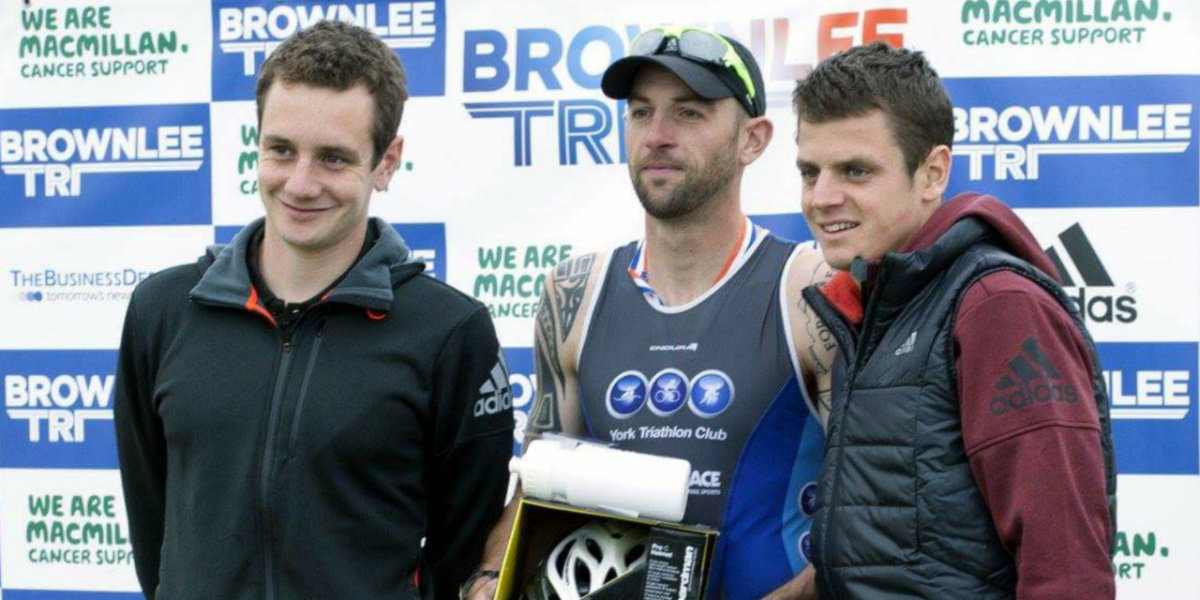
Last week we spoke to international triathlete and Pickering resident Geoff Wynn - pictured above with triathlon legends Alistair and Jonny Brownlee - about how he got into the sport. This week, he talks about training considerations and offers advice for newcomers.
What are the first considerations for people thinking of doing their first triathlon?
Training for your first triathlon realistically depends hugely upon two factors; how fit are you already and what distance have you decided to do? If we base it on a sprint triathlon, as the majority of people will go for this as a first option, you need to be able to swim 400 metres, bike 20km and run 5km (or walk if you want to). Some people will be stronger in one or two aspects of the race and others will be starting from ground zero in all three.
If you have strengths in one or two then it’s important to focus on the weakest discipline. When we apportion time or distance to triathlon training the easiest way is to look at it in terms of what percentage of the race each discipline takes up and then break your training up to reflect that. If for example you expected your swim to take 15 minutes, your bike 45 and your run 30, it could be broken down into 15% swim, 50% bike and 35% run.
When training in the build-up to the event you should always ensure around two weeks prior to it that you can comfortably cover the required distances in each discipline. Let’s not jump the gun and try and complete personal bests in each one but remember for the vast majority of first timers there is only one goal in mind and that is to complete the race. Competing comes later if that’s your thing.
Very sensible. How hard should people train?
The biggest myth in training is that if it’s not hard or it doesn't hurt, you aren't improving. This is total and utter trash! Ever heard the phrase train slow to race fast? It’s a reality – and one it took me a long time to get my head round. The largest part of my training is done in low heart rate zones allowing me to build a strong engine and endurance, which is then complemented with short, hard intervals to improve speed.
When your main goal is to complete the triathlon, we just need to look at building up distances and need to remember the 10% rule. This gives us a safe increase in total time and distance each week which helps to build the base and not overly fatigue the body. Training each discipline two to three times a week will be more than sufficient to get even a total beginner round the course and we should try to break the sessions into an easy, long session where we build endurance, a short interval session that helps us to improve speed and build our body’s ability to handle higher workloads and a tempo session where we work around 15% below our perceived “race pace” for just longer than we expect the discipline will take us in the event so our body is used to prolonged periods of harder work.

What’s your best piece of advice to newcomers?
My top tip for first timers is to practice some 'brick' sessions. This is where you do two parts of the triathlon back to back, so a swim to bike or a bike to run. This will help your body to adapt to the changing use of muscle groups and systems. On my first triathlon, I came out of the second transition after completing the bike leg and got jelly legs just as I approached a 90-degree bend, which led to me continuing in a straight line and narrowly avoiding going head-first into a hedge, much to the amusement of my spectating family!
These tips will give you the ability to get through your first event and all I can say is going out and training will make completing the event a lot easier but there are plenty of people who rock up to a start line having done very little, wing it and still get through the event.
If you do decide you want to be a bit gung-ho and go for a longer distance, training becomes much more important and this is when a good structured plan comes into place or even a coach if you need that motivation of someone pushing you constantly and ensuring you complete your sessions. Clubs are a great place to start and you'll meet like-minded people with a wealth of knowledge who'll help you along the way. Just bear in mind they'll probably talk you into entering every race going!
However you choose to go about it, it’s a personal choice about what you want from the event. There’s no shame at all in walking the run section or freewheeling down every hill on the bike to make it as easy as possible. Just remember when you're out there doing it you're lapping everyone who's sat at home on the sofa and you'll be going off with a nice medal and a huge sense of satisfaction!
Watch out for future updates as Geoff competes in the 2022 season, including the World Sprint Distance Duathlon Championships in Romania in June and the World Triathlon Championship Finals in Abu Dhabi in November.